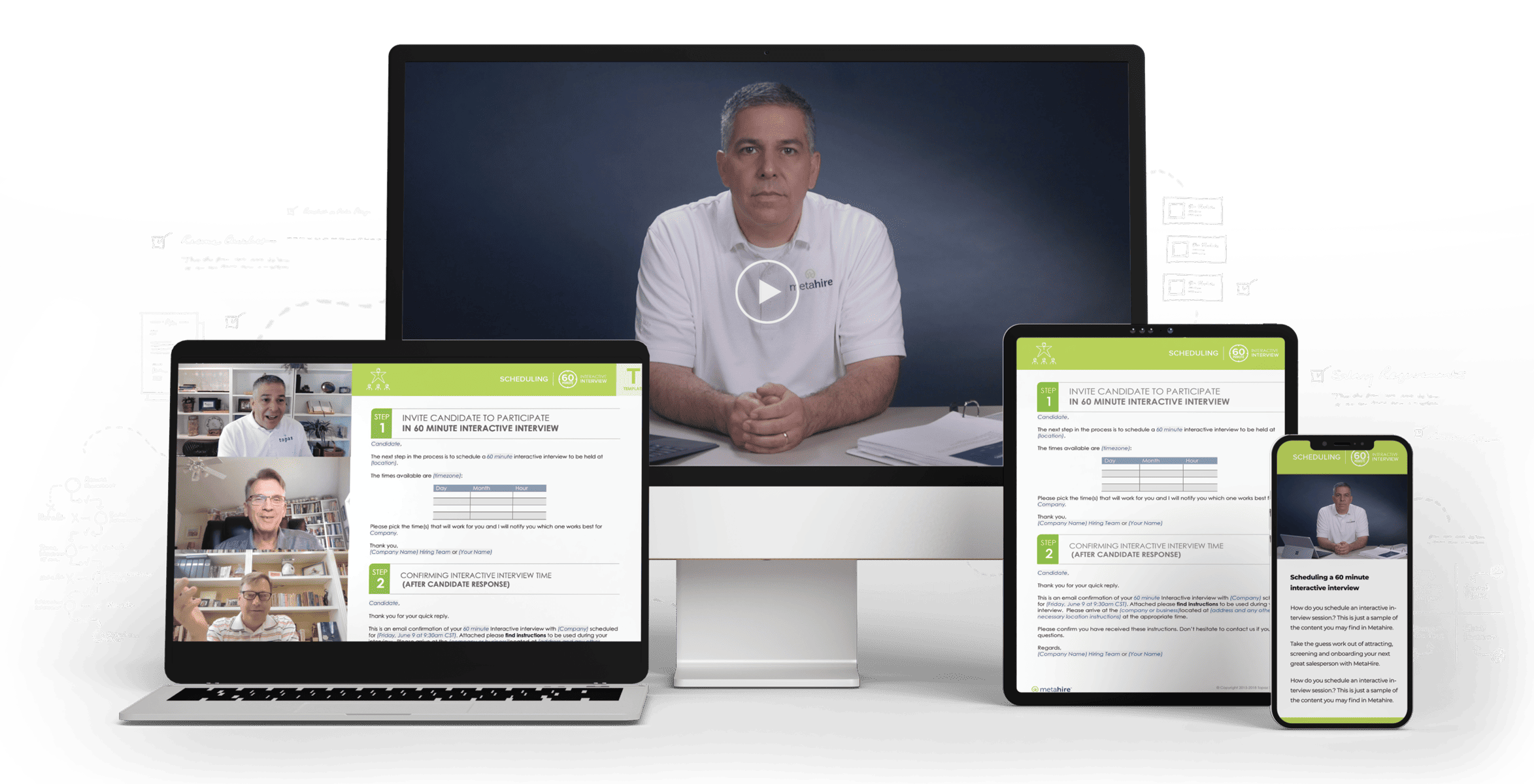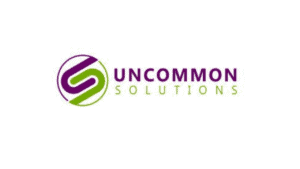What do you think of when you hear the phrase “sales consultant for small business?”
If you’re like most SME owners, there’s a chance that you’re imagining a silver-tongued pro talking scripts, tactics, and promises of quick wins.
Guess what:
That’s no small business sales consultant.
Why?
Because templates, salesy tactics, and empty promises aren’t enough to drive real change. A real sales consultant for small businesses takes the professor hat off and saddles up with you to be part of your journey.
Hire the right one, and that same consultant will serve as a guide who dives into your small business sales strategy, uncovers hidden roadblocks, and equips you with the right tools to build a sustainable path forward.
Remember this when you’re hiring a sales consultant for your business.
Here, we’re cutting through the noise and confusion and getting clear on what a sales consultant does (and shouldn’t do).
Myth Busting: What Small Businesses Get Wrong About Sales Consultants
Have you always been under the impression that a small business sales consultant dishes out training seminars, dials in your pitches, and leaves after sending you the bill? That’s the first myth we’re busting.
Myth 1: Fix Script, Train Sales Team, Bounce!
You wouldn’t be reading this if you could solve sales problems with a few memorized lines. Beyond checking what makes or breaks your pitches and how they’re delivered, a real sales consultant for a small business develops strategy, structure, and workflows for improving sales performance. This means sales coaching for small businesses and a full audit of your hiring processes.
Myth 2: “Sales Consultants Are Only for Big Companies.”
Have you ever been on the fence about hiring a sales consultant?
Believe it or not, sales consulting is equally beneficial and available for both large and small businesses. So, don’t be fooled by anyone who says you’ve got to spend big to make it big!
Myth 3: “Hiring a Sales Consultant Means You’ve Failed.”
We hear this one a lot.
And contrary to what any mediocre sales manager would tell you, there’s nothing wrong with hiring a sales consultant. In fact, doing so is a sign that you’re serious about sharpening your team’s sales edge.
When you hire a sales consultant for your small business, your business will benefit from real-world strategies, from prospecting to hiring new sales staff. For this reason, getting a consultant on board will be an investment that pays for itself — as you’ll see when you start seeing results.
Diagnosing Problems, Not Just Symptoms
For many business owners, sales problems are like leaky faucets — all it takes is a patch-up. However, like any leak, a sales problem remains unfixed when you don’t address issues at the source. Knowing this, a sales consultant for small business nips problems in the bud by identifying underlying problems that you’ll have likely missed.
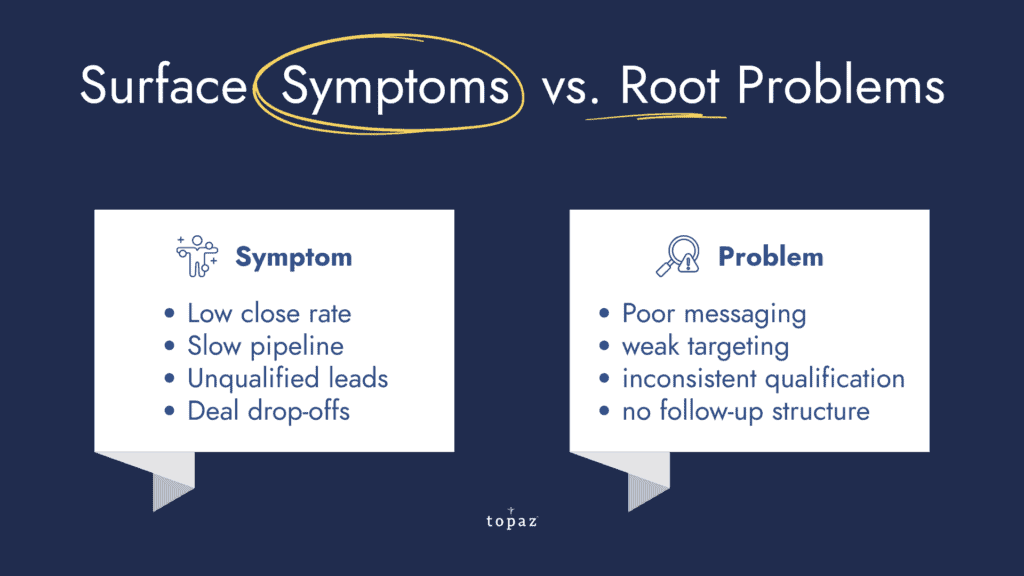
Looking Beyond the Obvious
Have you ever dealt with low closing rates? Most sales managers would jump on the problem, thinking that “it’s the pitch.” In reality, it might be a sign of a deeper problem like a lack of sales training or a tendency to “over-educate the buyer.”
Whatever the case may be, having a trained set of eyes looking into root causes can go a long way — and it’s one of the things your sales consultant does besides giving advice.
Auditing the Full Pipeline
Maybe it’s not your pitch or team. It might be your sales funnel — and a sales funnel audit is one of the things a small business sales consultant can provide.
From front to back, your pipeline and process will be under a sales consultant’s scrutiny. A sales consultant for small business looks into various aspects of your sales pipeline like your lead gen, messaging, prospecting, and buyer journey alignment.
Connecting “Symptoms” to Your “Structure”
You don’t fix weak sales by yelling louder in meetings or demanding more dials. The key is in understanding the chain reaction.
Where’s the breakdown?
What’s consistently being misunderstood or ignored?
Whatever the case may be, an experienced sales consultant for a small business identifies and connects every link.
Building a Scalable Small Business Sales Strategy
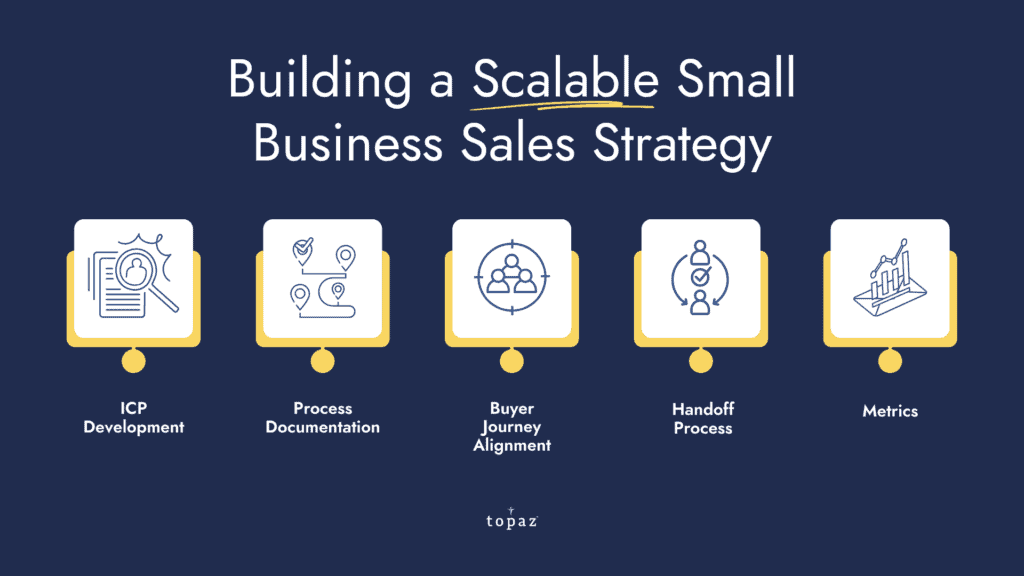
Here’s something that’s going to shock you:
Tactics, scripts, and even your team alone won’t help you scale.
Here’s what will — systems.
For this reason, one of the first things a sales consultant for small business does is gut-check your current sales strategy. And if you’re missing out on leads, prospects, and closings, there’s a chance you haven’t got one.
Building Your Strategy From Scratch
Too many small businesses rely on founder intuition or informal processes. Deals get closed, sure. However, there’s nothing about the approach that’s repeatable.
What do you think happens when that founder steps away from the frontlines? The whole system falls apart.
A real consultant helps map the full sales process:
- Who are you targeting and why?
- What does your buyer journey look like?
- Where are the drop-offs happening?
Get into a Q&A with your sales consultant for small business, and you’ll build the foundation of your small business sales strategy.
Predictable Is Profitable
All in all, a consultant gives your business a repeatable structure. A repeated structure is more likely to improve your results long-term because it involves documenting steps, testing what works, and creating a sales growth strategy you can train, scale, and hand off.
With the right help, you can build a sales strategy that works not just “for now” but for the long haul. And most importantly, your strategy and workflows can be in motion with or without you.
Coaching and Developing Small Business Sales Teams
Here’s another myth we should have talked about — sales training and coaching are the same thing, especially for small businesses.
We get it if you think this way. After all, there’s a lot of overlap between the two roles.
But think about it:
Training fades. The same isn’t true for coaching.
Understanding the distinction, a sales consultant for small business provides both, delivering your team both techniques and, most importantly, habits.
Why Coaching > Training
Yes, performance management requires both coaching and training. With that said, know that there’s a distinction.
Training is an event-based knowledge dump.
But unlike training, coaching keeps going. In other words, coaching is continuous, reinforcing what sales training covers to create habits.
That means someone (your sales consultant for small business) calling out weak follow-ups, missed signals, and half-baked discovery. Under the guidance of a consultant, your team will be clearer about what needs to be achieved and more relentless about progress.
A Tale of “Reps” and Repetition
Here’s a story to illustrate the importance of coaching atop training:
One of our clients had reps who knew the pitch but panicked when buyers pushed back.
But through targeted coaching that included real-time call reviews, feedback loops, and deal debriefs, those same reps started asking better questions, qualifying smarter, and holding ground during negotiations.
This example highlights the reinforcing power of sales coaching — and it’s one of the tasks a sales consultant for small business performs.
Helping Small Businesses Hire the Right Salespeople
For many businesses, hiring the right team is like a coin toss — it’s a game of chance.
Fall for this misconception, and you’ll end up with reps that you should have never hired in the first place.
So how can you find reps that can move the needle if you haven’t got a sales team hiring process in place? You call a sales consultant for small business.
Besides helping you zero in on your small business sales strategy, a consultant optimizes how you hire in the following ways.
Identifying “High Sales Performer” Qualities
It’s not always easy to be specific about what “high-performance” looks like. For this, a consultant can help and does so by identifying behaviors that drive outcomes, whether it’s curiosity, a growth mindset, or coachability.
Building and Sharpening Your Hiring Process
Besides helping you separate your hiring process from your sales process, one of the most critical tasks of a sales consultant for small business is building your sales rep hiring system and making it better. With a consultant by your side, you’ll be able to conduct structured interviews and assessments that help you identify the right candidates for the right roles.
And speaking of the right candidates, that brings us to the next point.
Hiring for Fit, Not Flash
When you hire well, you protect your pipeline, accelerate onboarding, and build a team that performs without drama. Miss the mark, and you reset everything — and your sales consultant helps make sure that doesn’t happen.
After all, let’s be honest:
Flashy résumés and fast talk won’t close deals in your environment.
Implementing the Right Tools and Technologies
So, you’ve got the team and maybe even the training. However, without tech, you’re leaving efficiency and productivity on the table.
Tech and tools can make all the difference, but only if you select the right ones. A sales consultant for small business can help you identify what your teams need and choose technology integrations that are a fit for your business.
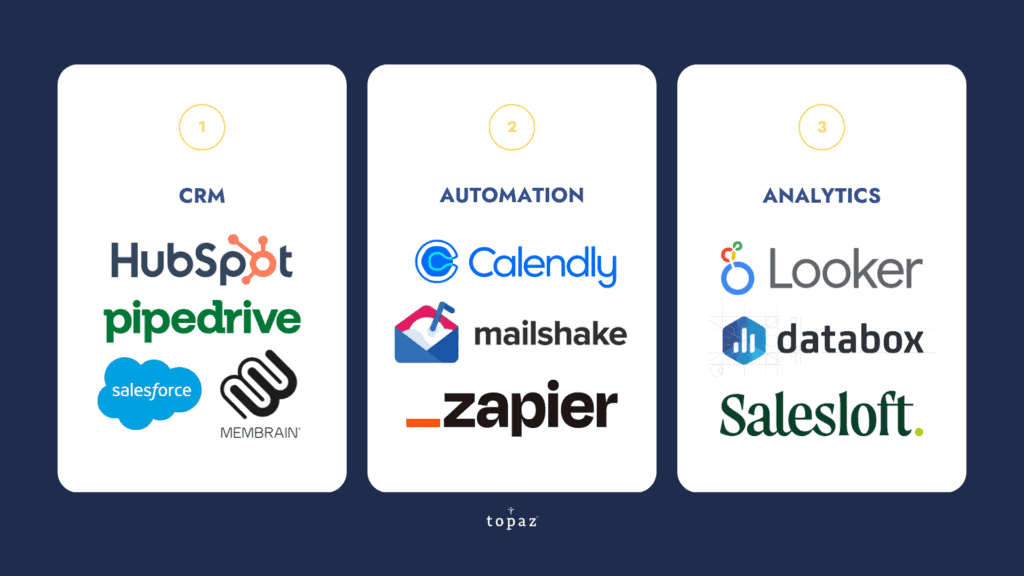
Choosing Tools That Fit You and Your Teams
Believe it or not, not every sales team needs a massive CRM with AI integrations and ten dashboards. In fact, tools like these are more likely to add friction and hurt more than help.
A consultant helps you identify what’s necessary and what’s just noise.
Sometimes, the right tech integration is as simple as using Pipedrive to clean up your pipeline. Or maybe automating follow-ups with Mailshake can save your reps time.
After all, the right tools are the ones your team will actually use.
Always Remember: Your Tools Should Support — and Not Replace — Reps
We always say this whenever the whole “Will AI replace humans?” discussion comes up:
Behind every well-used tool is the hand that uses it. Knowing this, a sales consultant for small business helps you identify tools your teams can use easily.
When Should a Small Business Hire a Sales Consultant?
If you’ve made it this far, you’ll have developed a better understanding of what a sales consultant for small business does. However, let’s try to answer the million-dollar question:
Do you need one?
Before hiring a sales consultant, ask yourself these questions:
- Are you stuck in founder-led sales mode?: If you’re the only one who can close, you don’t have a sales team — you have a dependency. THAT’S not scalable.
- Are your results inconsistent?: Some quarters are great. Others flop. There’s no system, no rhythm, and no real way to predict what’s coming next.
- Is your sales and hiring process easily forgotten?: If your team can’t explain how they sell — or worse, they all explain it differently — it’s time for structure.
- Are you unable to grow without working more?: Hustling harder only works for so long. A consultant helps you build systems that work even when you’re not “on.”
If you’ve answered “yes,” to any of these questions, there’s a chance you need to hit us up and get some serious sales consulting.
How To Choose the Right Sales Consultant for Your Small Business
So, we know you need a sales consultant for small business — but how can you find the right one for yours?
1. Check Out a Consultant’s Track Record
There are tons of consultants who have worked with big-label businesses, but your business is different.
Hence, ask about whether or not a sales consultant has ever worked with small businesses like yours. While you’re at it, it’s not a bad idea to request a portfolio or case studies.
A solid track record of working with small businesses tells you that a consultant has the know-how to help you improve your sales performance.
2. Watch How a Consultant Diagnoses Problems
Have you been handed a playbook from day one? Run! A real sales consultant for small business asks you sharp questions to craft a bespoke strategy for improving sales performance.
3. Pick a Consultant Who Prioritizes Fit Over Flash
Do they understand how your buyers make decisions?
Can they adapt their process to your model and budget?
A consultant worth hiring helps you create a small business sales strategy that feels like a fit. After all, it’s one thing to scale — but scaling the way you can and want to is another.
The Value of a Sales Consultant for Small Business: More Than Pitch Patch-Ups and Training Tweaks
You’re missing the real value if you think a sales consultant for small business is just there to tweak scripts or hold training sessions.
When you’re struggling with sales problems like low closings or buyer friction, there’s a chance you need a sales consultant to diagnose deeper problems. A consultant is also your ally in developing a system that gets you the right team members before the wrong ones cost you leads, prospects, and sales.
Most importantly, a sales consultant helps you build a system that runs itself. This way, you’ll be able to scale your business without having to put the extra hours in.
When you get a self-sustaining system, solid hiring processes, and a team that’s on board and ready, you’re building a business that’s primed for sustainable growth. And no other professional is ideal for getting you all of these than a sales consultant for small businesses.
Are you ready to build your business for profit and scale? Reach out and let’s talk!
FAQs
What Exactly Does a Sales Consultant for Small Business Do?
A sales consultant for small business is a professional who helps you identify what your business needs and helps you optimize anything that needs improvement. A consultant determines what’s holding your sales back, whether it’s inconsistent messaging, weak processes, poor hiring, or the wrong tools.
How Is a Sales Consultant Different From a Sales Trainer?
A sales trainer usually shows up, runs a session, and disappears. A sales consultant is there for you for the long term.
A consultant reviews your pipeline, coaches through live deals, and adjusts your approach as conditions shift. With a sales consultant for small business, you’ll be supported by a partner who sticks around and makes sure the work gets done.
When Is the Best Time to Bring in a Consultant?
There’s no need to wait for things to go South before hiring a sales consultant. If you’re thinking of bringing one in, watch out for:
- You’re the only one closing deals.
- Sales results are inconsistent.
- There’s no clear or documented process.
- Growth depends entirely on your time.
- You’re hiring but turnover is high.
- The pipeline feels thin or random.
If even one of the above sounds familiar, it’s time to talk to a sales consultant for small business.

